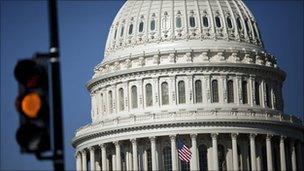House of Representatives votes against US Libya role
- Published

The US House has refused to give President Barack Obama authority to continue US participation in the Nato-led operation in Libya, but rejected a bid to cut off money for the conflict.
The US role in the Nato mission has drawn criticism from many in Congress in recent weeks.
Opponents say the three-month-old operation requires Congress's approval.
But the Republican-led vote against approving the conflict is largely a symbolic political move, analysts say.
"The president has operated in what we now know is called the zone of twilight as to whether or not he even needs our approval," Republican Representative Tom Rooney of Florida said. "So what are we left with?"
Mr Obama says he does not need additional congressional approval, as US forces are simply supporting Nato.
His allies in Congress urged members of the House to vote for the resolution authorising the conflict.
"A sudden withdrawal of American support for the mission would strengthen Gaddafi's hand and increase his confidence that he can wait out the rebellion against his rule," Democratic Whip Steny Hoyer of Maryland said on the House floor.
"It would put civilian lives at risk... I urge my colleagues: protect our valuable alliances and the principles of human rights that they safeguard."
War Powers resolution
Under the terms of the authorisation resolution, the US would have been allowed to conduct "limited" operations for one year in Libya.
The introduction of ground troops would have been banned.
Analysts suggest Democrats angry at Mr Obama's continued commitment of resources to the Libya campaign could refuse to vote against the resolution, delivering another rebuke to the president.
Later on Friday, Democrats and 89 Republicans beat back an effort to cut off funding for drone attacks and airstrikes against Libya, but which would have allowed US forces to continue supporting the Nato mission.
The vote on the funding measure was 180 in favour to 238 opposed.
The disagreement between Congress and the White House stems from a Vietnam War-era law, the War Powers resolution, intended to constrain the president's ability to wage military conflict with congressional approval.
Under the US constitution only Congress can declare war, and the 1973 War Powers resolution requires that, without such a declaration, a president who sends US military forces into conflict must get authorisation from Congress if the hostilities last longer than 90 days.
Last week, Mr Obama informed Congress that administration lawyers deemed the Libya conflict did not require additional congressional approval, arguing US forces were merely playing a supporting role in the Nato campaign.
That role, the White House says, does not match the definition of "hostilities" as described in the War Powers resolution.
- Published18 June 2011
- Published15 June 2011
- Published14 June 2011